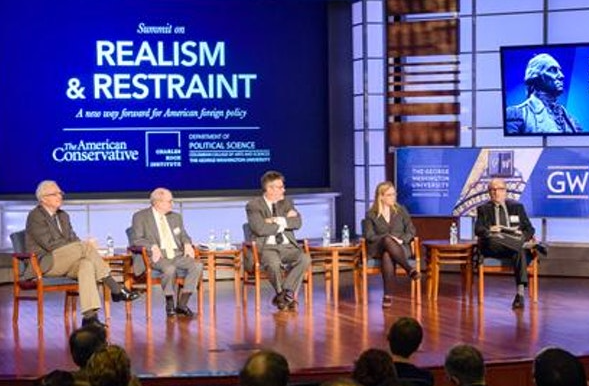Restraint and Reorienting U.S. National Security

Oona Hathaway makes the case for radically reorienting U.S. national security policy to address the real significant threats to the country. Among other things, that means winding down the endless war and our preoccupation with militarized counter-terrorism:
If one believes, as I do, that the fundamental goal of a national security program should be to protect American lives, then we clearly have our priorities out of place. Just as the 9/11 attacks led to a reorientation of national security policy around a counterterrorism mission, the COVID-19 crisis can and should lead to a reorientation of national security policy. There should be a commission styled on the 9/11 Commission to assess the failures of the U.S. government, both federal and local, to respond to the pandemic and to chart a better course forward. Until then, a few key steps that we should take are already clear:
First, we should spend less time and resources on counterterrorism efforts abroad. The “endless wars” that began after 9/11 should finally come to a close.
The U.S. should be ending the “war on terror” in any case because the threat does not merit the enormous resources devoted to fighting it, and the militarized overkill over the last two decades has helped to create far more terrorist groups than there were before it began. On top of that, the U.S. has much bigger concerns that pose far greater and more immediate threats to the lives of our people and to our way of life than terrorism ever could. A pandemic is a threat that is now obvious to all of us, but for the last two decades it was not taken nearly as seriously as imaginary Iraqi WMDs and potential Iranian nukes. We have been straining at gnats for at least half of my lifetime, and when the real danger appeared many of us were oblivious to it. Not only have other threats been blown out of proportion, but the more serious threat that is now upon us received virtually no attention until it was already upon us. Like Justinian wasting decades waging useless wars, we have been caught unawares by a plague, but in our case we have far less excuse because there were many warnings that something like this was coming and could be brought under control. Nonetheless, we allowed our defenses against it to grow weaker, and the current administration did as much as possible to dismantle what was left.
Once the immediate crisis is over, the U.S. needs to shift its focus away from fruitless military campaigns in Asia. We need to reallocate resources away from the bloated military budget, which has had so little to do with actually protecting us, and plow most of those resources into pandemic preparedness, scientific research, and building up a much more resilient health care system. Pandemics aren’t wars, but guarding against pandemics is an important part of national security and it is arguably much more important than having the ability to project power to the far corners of the world. Because pandemics are global phenomena, guarding the U.S. against them will entail more intensive international cooperation than before. Hathaway continues:
One clear lesson of this crisis is that when it comes to a pandemic, no nation can protect itself on its own. International cooperation is essential. The World Health Organization has played an important role in battling the virus. But it has been hobbled by limited funding, and it’s busy fundraising to support its work even as it’s trying to undertake ambitious programs. The United Nations Security Council, meanwhile, has been mostly absent from the conversation. The pandemic is global and it requires a global approach. But these international institutions have not had the funding or the international support to play the role they should have in coordinating a quick global response to the spread of the virus. When this crisis is over, it will be essential to evaluate how to coordinate a faster, more effective global response when the next pandemic arises.
All nations have a shared interest in pooling resources and sharing information to bring outbreaks like the current one under control. As tempting as it may be for some hard-liners to engage in great power rivalry in the midst of such a disaster, the responsible course of action is to pause these contests for the sake of resolving the crisis sooner. The U.N. response has been hobbled by mutual recriminations between some of the permanent members of the Security Council, specifically the U.S. and China, and if there is to be an effective and coordinated global response that sort of demagoguery and point-scoring will have to end.
Scaling back the size of the military budget will necessarily involve reducing the U.S. military footprint around the world. It is not reasonable or safe to expect a smaller military to support a strategy of primacy. Primacy was always unsustainable, and it was just a matter of time before the time came when it would have to be abandoned. It turns out that the time for abandoning the pursuit of primacy came earlier than expected. The U.S. should have started making this transition many years ago, but recent events make it imperative that we begin now.
Comments